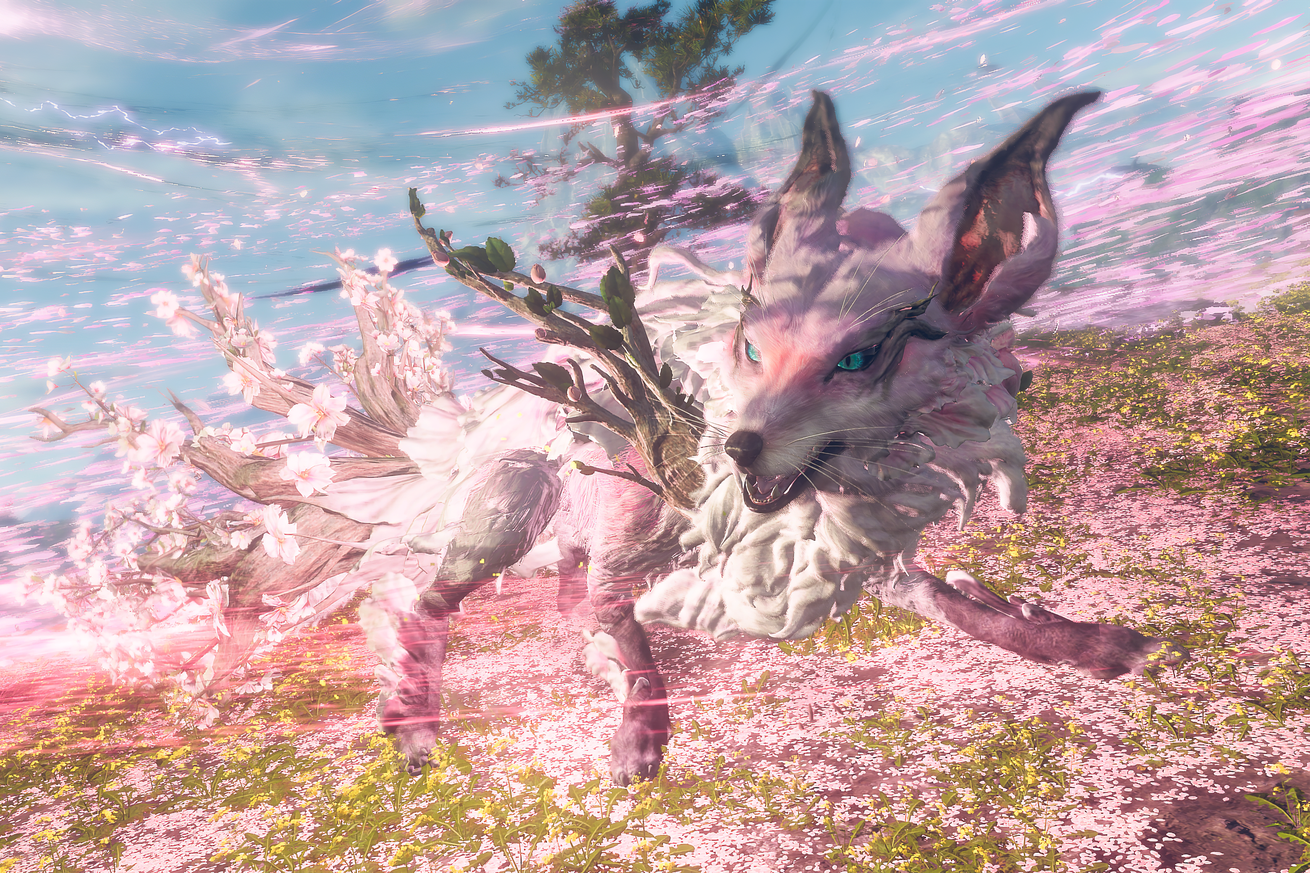
The first big Wild Hearts update is beautiful and deadly
In the monster hunting game Wild Hearts, the creatures you face off against are a mash-up of animals and nature. There are towering wild hogs made out of wood and giant rats covered in glowing mushrooms. And the game’s first big post-launch update will add a new monster perfect for the season: Murakumo, a beautiful fox covered in cherry blossoms.
Though it’s coming after the game has launched, Wild Hearts director Takuto Edagawa says that the new creature has been in the works since early on in development. “We wanted to include a fox or a vulpine creature from the very beginning,” he explains. “And we wanted to make it a special creature because they have a very special meaning in Japan in terms of faith and religion.”
For the development team at Omega Force, part of making the Murakumo special was making it something players had to wait to see; you won’t be able to fight it until taking on a quest that takes place after the main campaign is complete. The creature is also the first one to focus on ranged attacks. It has the ability to glide around on cherry blossom platforms and can control thunder for attacks, which should introduce some new strategies into the game.
As with all of the creatures in Wild Hearts — called kemono in the game — the Murakumo was designed by combining natural elements from the real world. “To create them, we focused on a fusion of two elements everyone knows and fears: the power of nature and wild beasts,” explains Kotaro Hirata, who also served as director on the game. “Kemono are the axis on which all the game’s features, world view, stage design, and gameplay are based.”
Edegawa adds:
After the kemono were created from the fusion of nature and wild beasts, we began to work on designing the world and the hunting areas. In particular, we discussed the question of ‘how do we approach nature’ when thinking about the world setting. Throughout human history, nature has always been something both feared and worshiped. However, we do not believe that nature intentionally punishes or rewards humans. It just exists, while human beings like to assign it intentions on their own. We would love for players to experience this beauty and cruelty of nature and consider these human feelings towards it through this game.
That design process involved plenty of research — the team looked at lots of nature documentaries and encyclopedias and even had a few field trips to the zoo — as well as the typical trial and error inherent in game development. Instead of recreating specific animals, they tried to merge elements of existing wildlife to create something new. As an example, when it came to sound effects, each kemono utilized noises from multiple animals.
“In the end, we decided to combine different animal sounds to create original sounds for some of the kemono,” says Hirata. “Spineglider is a cute and relatively small kemono, so we wanted to give it a high-pitched voice, which we created by combining squeaks of some rodents, like mice and squirrels, as well as some dolphin sounds. In contrast, Dreadclaw’s sounds not only combine a rooster but also pig, lion, and elephant sounds to enhance its ferocity. And for Kingtusk, which is one of the largest kemono in the game, we actually had staff members perform the sounds during the trial-and-error period in the early stages of development.”
“It had to be beautiful but scary as well.”
For the new Murakumo, one of the biggest challenges was balancing the intrinsic beauty that comes from the fox and cherry blossom motif with being a deadly animal players have to ultimately fight and kill. The creature was designed by artist Morita Yuuki, who worked with the team at Omega Force to bring it to life. “It had to be beautiful but scary as well,” says art director Marina Ayano. “That balance was very important. The kemono is very beautiful to look at when you’re not fighting, but once you engage in the battle and it becomes enraged, you’ll see its nine tails and thunderous powers, and that is the scary part. It was a very fine balance.”
Since all of the gear you craft in the game comes from the beasts you hunt, the introduction of the Murakumo also means new weapons and armor to collect. There are pink, blossom-infused axes and umbrellas and a pretty new outfit. Additionally, the game is adding a new karakuri — a kind of ancient technology that players can build to aid them in battle — that’s like a deadly spinning top.
According to Edagawa, the goal with this batch of post-launch content, and those that will come after, isn’t just to make the game harder (though the Murakumo does seem like a pain to fight). Instead, it’s to give players more reasons to continue exploring the world after the campaign is over.
“Just adding more difficult quests, I don’t think that’s sufficient,” he explains. “I think that players will get bored of that. We want to focus on the growth of the game and the growth of the player and making that process fun. We want to tweak the system so that it’s fun to battle the same kemono over and over again. To give it a different feel, so that with these updates, we can make the gaming experience more diverse.”
The new (and free) Wild Hearts update is available starting today.

